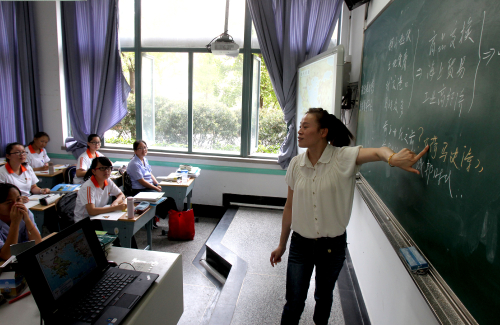|
 |
|
A THING OF THE PAST: A history teacher in the middle of a class at Shanghai Jinyuan High School on September 16, 2014 (LIU YING) |
After years of consideration and reconsideration, the Chinese Government finally decided to reform its college entrance exam, also known as the gaokao, aiming to reverse exam-oriented education to help fuel future growth.
Following the State Council's general guidelines in September last year, the Ministry of Education (MOE) announced specific reform measures of the gaokao system on
December 16, asking universities not to base their judgment of applicants solely on scores but to make comprehensive assessments of applicants.
The current situation is that most students undertake a fixed, universal diet of exam subjects in either the sciences or arts.
In the future, students will be allowed to submit the scores of three subjects from a pool of six--biology, chemistry, geography, history, physics and politics--together with their mandatory Chinese, math and English scores.
"The new regulation will help students take advantage of their strengths and overcome their shortcomings," said Zhou Bin, a schoolmaster from Haining, east China's Zhejiang Province, adding that students often paid too much attention to their weaknesses.
China resumed the gaokao system in 1977. Since then, the exam has been called a "single-plank bridge" because it is the only way for youth to obtain a promising career beyond vocational training.
MOE figures show that 9.39 million students took the gaokao last year, an increase of 270,000, or 3 percent, from 2013. In 1998, the figure was 1.08 million, but after recruitment was widened in 1999, the number has soared.
However, with limited slots for university education, competition for entrance into higher education institutions is cutthroat and heavily reliant on gaokao scores.
As a result, students are often trained to focus only on test scores, memorizing endless lists of textbook answers instead of developing a sense of independent and innovative thinking.
This time, the sweeping changes to the gaokao system put emphasis on all-around development in pursuit of the country's untapped talent. "If this can be achieved, students will have more independence and can make choices that align with their educational ambitions," said Xiong Bingqi, Deputy Director of the Beijing-based 21st Century Education Research Institute.
Two pilot regions
On September 4, 2014, the State Council, China's cabinet, released the reforming guideline for the country's gaokao system. It selected Shanghai Municipality and Zhejiang Province as two testing grounds for the reform.
The two pilot regions then announced their own reform plans, promising to allow their high school students to learn a wider range of subjects. The reform plans of both regions said that the annual gaokao will no longer be the only criterion for college admission and that students will not be forced to choose a preference in majors from either liberal arts or sciences.
With the changes, students will still be tested on Chinese, math and English. But for the three remaining subjects, students in Shanghai and Zhejiang can choose to be tested on a wider range of topics from geography, history, chemistry, biology, physics and politics, among others. Starting in 2015, the first selective classes will begin at several high schools in the two regions, according to the pilot plans.
Chen Weixin, a teacher with the Enrollment Administration Office of Shanghai Fudan Secondary School, said the school will open six selective classes including politics, history, geography, physics, chemistry and life sciences for students. Students can make the decision on which three classes they want to choose to have the final scores included in their gaokao scores at the end of the second senior one semester.
Chen said the new system also allows academically gifted students to advance to a higher-level class according to their performance.
Shanghai Shibei Secondary School also confirmed they will change their curriculum to align with the gaokao reform beginning in 2015.
The school's principal Chen Jun said they have already opened opportunity classes for gifted students. In the coming months within 2015, the school will further specify curriculum changes involving the new selective classes.
Based on Shanghai's education reform plan, in 2017 higher learning institutions will have the freedom to enroll students with special academic gifts rather than simply considering the unified exam scores.
Under the new enrollment scheme, colleges may favor a student by taking into consideration the score of one of the student's three selective classes.
Ye Zhiming, President of Shanghai University, said the reform gives universities more autonomy in choosing students to study specialized subjects.
| 